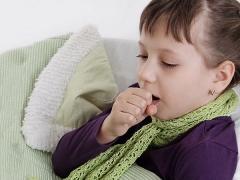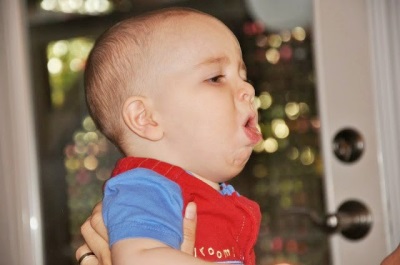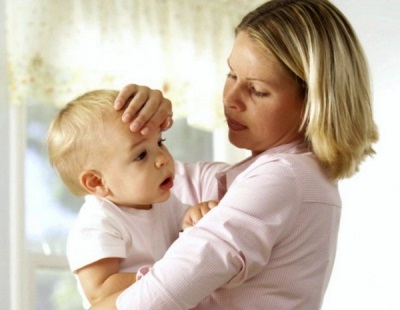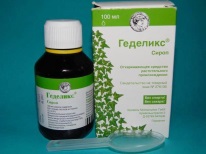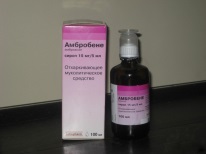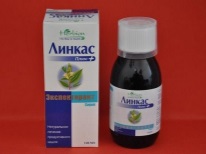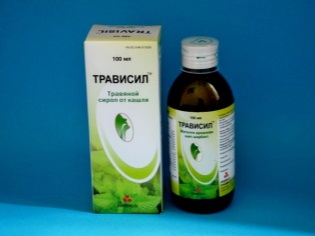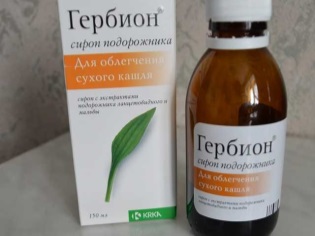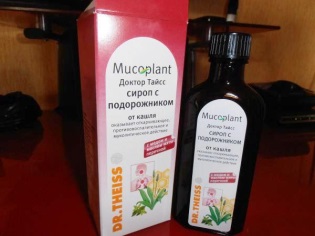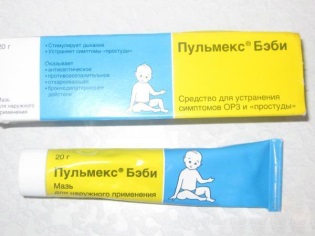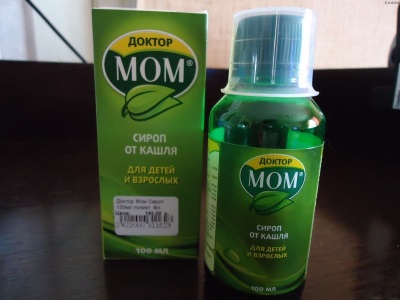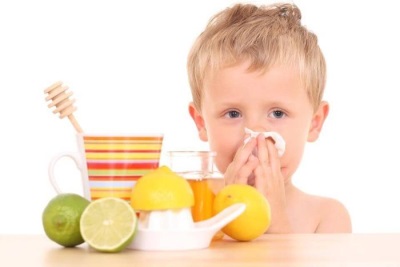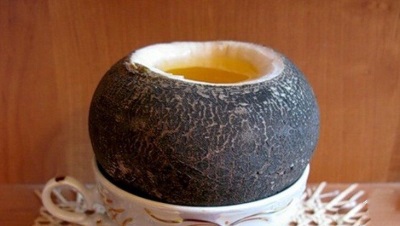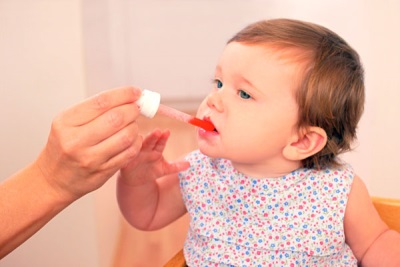How to treat dry cough in a child?
One of the frequent symptoms of various diseases in children is a dry cough. Usually, it causes severe discomfort, so when it appears, parents try to help the child in all available ways.
Causes of Cough
A dry cough may appear in a child with:
- SARS. Once in the respiratory tract viruses cause an inflammatory process in the mucous membrane and excite cough receptors. In this case, the defeat of the respiratory system can occur at different levels - from the pharynx to the alveoli.
- Inflammation of the vocal cords. The appearance of cough contributes to the narrowing of the glottis, as a result of which the child has either a quiet or “barking” cough. Such inflammation may be caused by viruses or a bacterial infection, an allergic reaction, toxic effects of vapors or a loud cry.
- Infections of the respiratory tract of a bacterial nature. These include whooping cough, tuberculosis, diphtheria and other diseases caused by bacteria and affecting the respiratory tract. Cough, as a symptom of tuberculosis, is usually long and persistent. It appears at night and in the morning, and gradually from dry to wet, which practically does not stop. Cough with diphtheria occurs as a result of swelling of the throat and larynx. With a child whooping cough, he suffers from dry coughing attacks that appear as a result of irritation of the cough center in the brain, as well as due to an increase in the viscosity of sputum.
- Allergies. In such a situation, cough occurs due to exposure of the mucous membrane of the respiratory tract to allergens that cause the inflammatory process.
- Pleurisy. One of the symptoms of the inflammatory process in the pleura is a strong cough reflex that causes severe discomfort to the child.
- Gastroesophageal reflux. A feature of cough caused by such a reason is its appearance after eating. It usually occurs when a child falls asleep after eating, and the acidic contents of the stomach fall into the mouth, and then inhale - into the respiratory tract.
- Foreign body in the airways. Such a reflex cough occurs abruptly and is characterized by the absence of any other symptoms. Depending on the size of the foreign object, such a cough can be very strong.
- Worm invasion. The larvae of some parasites pass through the child’s lungs and are capable of causing a weak but persistent dry cough.
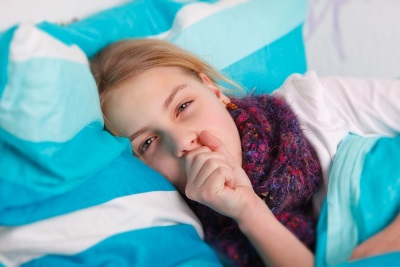
Much less often, dry cough is one of the symptoms of a tumor process in the lungs, heart disease, inflammation of the lymph nodes in the area of the bronchial tree or an aortic aneurysm.
It is also worth noting that in infants in the morning there may appear a physiological cough, during which the airways clear of sputum. At the same time, there will be no other symptoms of discomfort.
What is dangerous?
Cough is inherently a protective reflex and can occur in a healthy child, but a prolonged dry cough most likely indicates that the baby has some problems with the respiratory system.Sometimes these are diseases whose treatment should be started as soon as possible. So if a protracted cough torments a child for more than a day, you should definitely go to the doctor with a baby.

Special features
Cough at night
For many children, the cough is worse at night because the sputum in the supine position separates worse. In addition, the cough can also provoke mucus flowing from the nasopharynx. In addition, if the nasal breathing of the child is difficult, the crumb will breathe through the mouth in a dream, which will lead to additional drying of the mucous membranes and increased dry cough.
Barking cough
They call a strong cough like a barking dog.
This rough cough, in which you can hear whistling and wheezing, often occurs with whooping cough. Other causes of this cough are laryngitis, allergies, nervous disorders, dry air in the room, foreign body in the larynx.
Barking cough significantly affects the well-being of the child, increases at night and, as a rule, occurs paroxysmally. During such a cough, a child’s voice may even disappear.
Allergic cough
Such a cough can occur for no apparent reason, occasionally disappearing and reappearing. Such a cough is often associated with the flowering period, as well as with the effect on the child's body of household allergens. He is often accompanied by a runny nose and lacrimation, and the temperature with such a cough, as a rule, does not rise.
Temperature as a sign of disease
The most common occurrence of dry cough is combined with increased body temperature. Such symptoms are characteristic of acute respiratory infections. A child may also have weakness and lethargy, poor appetite, runny nose, moodiness and other manifestations of the disease. As a rule, after a while the nature of the cough changes - it becomes wet.
Child care rules
- To prevent the dry air of the room from provoking additional coughing episodes, it should be moistened. Use a special device, wet towels or containers of water.
- Maintain optimum temperature conditions. Let the temperature in the room where the child is coughing be around 20-22 degrees.
- Avoid any irritating effects on the respiratory tract. To the child should not get any chemical odors or tobacco smoke.
- Take care of special drinking regime. Give a cough to a child more often a warm alkaline drink, such as non-carbonated water, tea, or milk.
- Food during the period of illness is best done sparing. Do not force the child to eat if he refuses. Low-calorie and light dishes are preferable in the menu, for example, fruit puree, jelly, mashed potatoes.
Medicines
When applying medications in the treatment of dry cough in children, these nuances should be kept in mind:
- In childhood there is a high risk to exceed the dose. For this reason, the use of medicines to eliminate cough in babies under 2 years of age should be monitored by a doctor, choosing the exact dosage according to the age and weight of the child.
- All drugs have side effects. The medicine can be safe for adults, and in babies can cause drowsiness, dizziness, allergies and other problems.
- Children under two years old do not know how to cough up sputum, therefore expectorants drugs they try to prescribe as little as possible.
- Kids are more sensitive to different chemical compounds, so the prescription of any medication should be combined with heavy drinking.
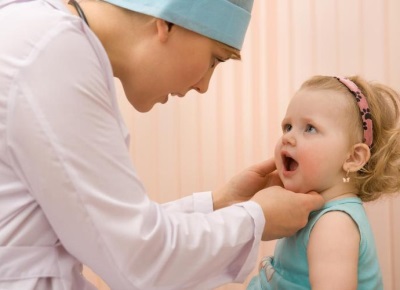
In the treatment of dry cough in childhood are used such groups of drugs:
- Means that inhibit the cough reflex.They affect the brain of a child.
- Local preparations. They moisturize the mucosa and relieve irritation.
- Drugs that reduce the viscosity of sputum, thereby improving its discharge.
- Antibiotics and antimicrobials. They are prescribed in situations where the cough is a symptom of a bacterial infection.
- Combined drugs. In addition to coughing, they also affect other symptoms of the disease, for example, they reduce the temperature.
Effective drugs for treatment
Most often, syrups are used to treat dry cough in childhood. The choice of a suitable drug is primarily influenced by the age of the child.
For babies
At the age of one year, children are often prescribed Prospan and Gedelix. These are mucolytics based on ivy leaf extract. Also, babies under the age of 12 months may be dispensed with syrups containing Ambroxol, for example, Ambrobene or Lazolvan. Altea-based syrups are permitted at this age, and six months babies can be given Linkas.
For children under 3 years
One-year-old children from cough are prescribed Tussamag (a preparation based on thyme extract), plantain syrup Dr. Theiss, as well as the multi-component herbal preparation Travisil. Two year old babies can take syrups Herbion (plantain or ivy), althea syrups and ambroxol syrups. The back and chest of the child can be lubricated with Pulmeks Baby.
For children over 3 years old
Syrup is permitted from the age of three. Dr. Mom. You can also give all the syrups used in the treatment of younger children.
Folk remedies at home
Quite often, when dry cough parents are limited to traditional methods of treatment, because they are available and can be used even in children up to a year.
The most common recommendations are:
- Gargle with water and salt (sometimes iodine and soda are added to it) or herbal decoction.
- Breathe steam.
- Drink tea with chest collection, broth hips, cranberry juice.
- To do different warming manipulations.
Here are some of the tools used in dry coughing in childhood in the arsenal. national treatment:
- Bring to a boil 500 ml of milk and cool. Stir in warm milk yolk, teaspoon of honey and Art. spoon cream. Give the child up to 5 times a day in the form of heat.
- Squeeze the juice from a medium-sized lemon, mix it with a spoonful of honey. Give the baby one spoon.
- In medium-sized black radish, cut the pulp and fill the radish with honey. A day later, pour the juice with honey and give the child three times a day a tablespoon. You can also squeeze the juice from the radish and mix it with a lot of sugar.
- Two teaspoons of roots devayasila brew a glass of boiling water, divided into three parts and give the child during the day.
- Mix sugar with water and boil down to brown. Let's give such caramel syrup to a child.
- Peel a ripe banana and crush it with a spoon, add boiling water and mix well. Give 2 spoons up to 10 times a day.
Compresses
A warming compress helps to cope with a dry cough thanks to a local increase in blood circulation. Before you put a compress baby, be sure to consult a doctor. For compresses, you can use boiled potatoes, a mixture of water, honey and apple cider vinegar, heated sunflower oil, and lard. When the compress is removed from the body of the child, it is important to immediately warm it up.
Inhalation
Such procedures help soften dry cough and moisten the mucous membrane. Usually for their use special devices, called nebulizers. At home, the child can simply breathe over the steam that rises from the brewed chamomile, boiled potatoes, sage decoction. Inhalation is permissible only in the absence of fever.
Should I use banks?
In the past, banks were often used as a remedy for colds and coughs, but nowadays their use is not recommended.This procedure is not only ineffective, but also traumatic to the skin.
Opinion Komarovsky
The famous pediatrician calls cough a useful reflex that clears the lungs of mucus, bacteria and viruses accumulated in them. He recommends combating dry coughing and drinking and providing cool air to the child.
Komarovsky considers it unacceptable to give children medications that inhibit cough, if they are not discharged by a doctor. He emphasizes that such drugs are permissible only for whooping cough and must be prescribed by a pediatrician. In other cases, a popular doctor advises to limit drugs that reduce the density of sputum and cause a reduction in the bronchi for its removal.
To effective and harmless drugs that help with coughing, Komarovsky considers mukaltin, lasolvan, potassium iodide, ACC and bromhexine. The doctor advises to keep them in his first-aid kit, but the advisability of their use and dosage in each case of cough consult with your doctor.
In the following video, Dr. Komarovsky gives advice on the treatment of dry feces.
Tips
- If you notice that the child often coughs, do not pull with an appeal to the pediatrician. It is better to make sure that the cough is physiological than to lose time in treatment. It is especially important to consult a specialist in time if the child is tormented by an exhausting cough.
- Buying any drug for a child with a cough, carefully read the instructions. Before you give a syrup to your baby, it is important to make sure that it suits you according to your age, and the dosage specified by your doctor matches the manufacturers recommendations.
- Remember that a child needs your care and love. Refer to the disease of the baby with understanding, even if the baby is naughty or refuses treatment.
